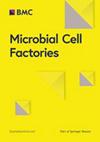Synthetic redesign of Escherichia coli W for faster metabolism of sugarcane molasses
IF 4.3
2区 生物学
Q1 BIOTECHNOLOGY & APPLIED MICROBIOLOGY
引用次数: 0
Abstract
Sugarcane molasses, rich in sucrose, glucose, and fructose, offers a promising carbon source for industrial fermentation due to its abundance and low cost. However, challenges arise from the simultaneous utilization of multiple sugars and carbon catabolite repression (CCR). Despite its nutritional content, sucrose metabolism in Escherichia coli, except for W strain, remains poorly understood, hindering its use in microbial fermentation. In this study, E. coli W was engineered to enhance sugar consumption rates and overcome CCR. This was achieved through the integration of a synthetically designed csc operon and the optimization of glucose and fructose co-utilization pathways. These advancements facilitate efficient utilization of sugarcane molasses for the production of 3-hydroxypropionic acid (3-HP), contributing to sustainable biochemical production processes. In this study, we addressed challenges associated with sugar metabolism in E. coli W, focusing on enhancing sucrose consumption and improving glucose-fructose co-utilization. Through targeted engineering of the sucrose utilization system, we achieved accelerated sucrose consumption rates by modulating the expression of the csc operon components, cscB, cscK, cscA, and cscR. Our findings revealed that monocistronic expression of the csc genes with the deletion of cscR, led to optimal sucrose utilization without significant growth burden. Furthermore, we successfully alleviated fructose catabolite repression by modulating the binding dynamics of FruR with the fructose PTS regulon, enabling near-equivalent co-utilization of glucose and fructose. To validate the industrial applicability of our engineered strain, we pursued 3-HP production from sugarcane molasses. By integrating heterologous genes and optimizing metabolic pathways, we achieved improvements in 3-HP titers compared to previous studies. Additionally, glyceraldehyde-3-phosphate dehydrogenase (gapA) repression aids in carbon flux redistribution, enhancing molasses conversion to 3-HP. Despite limitations in sucrose metabolism, the redesigned E. coli W strain, adept at utilizing sugarcane molasses, is a valuable asset for industrial fermentation. Its synthetic csc operon enhances sucrose consumption, while mitigating CCR improves glucose-fructose co-utilization. These enhancements, coupled with repression of gapA, aim to efficiently convert sugarcane molasses into 3-HP, addressing limitations in sucrose and fructose metabolism for industrial applications.对大肠杆菌 W 进行合成再设计,加快甘蔗糖蜜的新陈代谢
甘蔗糖蜜富含蔗糖、葡萄糖和果糖,因其丰富且成本低廉,为工业发酵提供了一种前景广阔的碳源。然而,同时利用多种糖类和碳代谢抑制(CCR)带来了挑战。尽管蔗糖富含营养,但除 W 菌株外,人们对蔗糖在大肠杆菌中的代谢仍然知之甚少,这阻碍了蔗糖在微生物发酵中的应用。本研究对大肠杆菌 W 进行了改造,以提高糖的消耗率并克服 CCR。这是通过整合合成设计的 csc 操作子以及优化葡萄糖和果糖共同利用途径实现的。这些进步促进了甘蔗糖蜜在生产 3-hydroxypropionic acid(3-HP)过程中的高效利用,为可持续生化生产过程做出了贡献。在本研究中,我们解决了与大肠杆菌 W 中糖代谢相关的挑战,重点是提高蔗糖消耗和改善葡萄糖-果糖协同利用。通过对蔗糖利用系统进行有针对性的工程改造,我们调控了 csc 操作子元件 cscB、cscK、cscA 和 cscR 的表达,从而加快了蔗糖的消耗速度。我们的研究结果表明,在删除 cscR 的情况下,csc 基因的单核苷酸表达可使蔗糖的利用率达到最佳,而不会对生长造成明显的负担。此外,我们还通过调节 FruR 与果糖 PTS 调控子的结合动态,成功地缓解了果糖代谢抑制,使葡萄糖和果糖的共同利用接近等效。为了验证我们的工程菌株在工业上的适用性,我们研究了甘蔗糖蜜中 3-HP 的生产。通过整合异源基因和优化代谢途径,我们的 3-HP 滴度比以前的研究有所提高。此外,甘油醛-3-磷酸脱氢酶(gapA)抑制有助于碳通量的重新分配,提高了糖蜜向 3-HP 的转化。尽管在蔗糖代谢方面存在局限性,但重新设计的大肠杆菌 W 菌株善于利用甘蔗糖蜜,是工业发酵的宝贵财富。其合成的 csc 操作子提高了蔗糖的消耗,而减少 CCR 则改善了葡萄糖-果糖的共同利用。这些改进加上 gapA 的抑制,旨在有效地将甘蔗糖蜜转化为 3-HP,解决工业应用中蔗糖和果糖代谢的局限性。
本文章由计算机程序翻译,如有差异,请以英文原文为准。
求助全文
约1分钟内获得全文
求助全文
来源期刊

Microbial Cell Factories
工程技术-生物工程与应用微生物
CiteScore
9.30
自引率
4.70%
发文量
235
审稿时长
2.3 months
期刊介绍:
Microbial Cell Factories is an open access peer-reviewed journal that covers any topic related to the development, use and investigation of microbial cells as producers of recombinant proteins and natural products, or as catalyzers of biological transformations of industrial interest. Microbial Cell Factories is the world leading, primary research journal fully focusing on Applied Microbiology.
The journal is divided into the following editorial sections:
-Metabolic engineering
-Synthetic biology
-Whole-cell biocatalysis
-Microbial regulations
-Recombinant protein production/bioprocessing
-Production of natural compounds
-Systems biology of cell factories
-Microbial production processes
-Cell-free systems
 求助内容:
求助内容: 应助结果提醒方式:
应助结果提醒方式:


